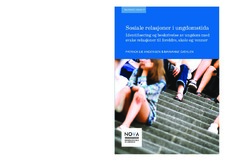| dc.description.abstract | In Norway, the majority of children and youth experience good living conditions. A considerable amount of research has shown that the today’s youth have good relationships with their parents, that they enjoy school and that they are satisfied with their friends. However, the emphasis in this report “Social relations in the youth years.”, is on the minority that are dissatisfied with their parents, do not enjoy school and/or lack close friends. The aim of the report is to describe the characteristics of these adolescents and portray how they are living their youth years. We have developed an indicator based on a nationwide survey conducted at all levels in lower secondary school and the first year of upper secondary school (Ungdata). This indicator, called Indicator of Vulnerability, shows that 18 per cent of the youth have weak relationships with their parents, school or friends. Less than one per cent express weak relationships in all three “arenas” (parents, school and friends). We assume that the youths’ vulnerability to being marginalized increases with the number of weak relationships. The results support the above-mentioned assumption. First, the youths’ health and self-esteem deteriorates when the number of weak relationships increases. This is particularly true regarding the likelihood of “being depressed”. Furthermore, the results show that weak relationships with parents and school have a stronger impact on poor health and self-esteem than weak relationships with friends. In Norway, the access to health services is often free of charge for youth. An important question is if these services are used and available to adolescents that express poor health and low self-esteem. Based on the results in this report, it seems reasonable to conclude that access to a psychologist/psychiatrist is relatively good for youths that have weak relationships with parents, school and friends, but that these teenagers do not use school health services (nurses and doctors), general practitioners and emergency clinics to the same extent as other youth. Second, the number of youth involved in bullying, violence and crime increases with the number of weak relationships. Third, teenagers that have weak relationships with their parents, school and friends participate less in organized leisure time activities. However, they often spend more time on activities that involve looking at a screen (TV, computer, tablet, mobile). An additional aim in this report is to examine weak relationships among the child welfare population. The results show that 37 per cent of child welfare clients experience weak relationships with their parents, school or friends. This is somewhat lower than expected, which presumably is due to the fact that child welfare clients are identified by the following question: “Have you been in contact with or received assistance from the Child Welfare Services?” – i.e. this question comprises not only youth that have received assistance from the Child Welfare Services but also youth who only have only been in contact with them. In addition, almost ten percent of all the respondents stated that they had been in contact with the Child Welfare Services, which is somewhat too high according to the national statistics on the child welfare population. Consequently, it seems reasonable to assume that some youth that answered that they have been in contact with child welfare services, misunderstood the question. Therefore, the results should be interpreted with caution. Nevertheless, different tests show that the Indicator of Vulnerability does manage to identify youth in a particularly difficult situation. The results from these analyses show that the majority of these youths have more challenging life circumstances than youth that have not been in contact with the Child Welfare Services. Furthermore, within the group of youth that has been in contact with the Child Welfare Services, youth that have weak relationships with their parents, school and friends, are overrepresented among those with poor health and low self-esteem. Moreover, they are more often involved in bullying, violence and crime and more often use drugs. The latter (being involved in violence, crime and using drugs) is increasingly more apparent among youth with several weak relationships compared to youth without weak relationships. Ungdata Ungdata is a cross-national data collection scheme, designed to conduct youth surveys at the municipal level in Norway. The survey is conducted in schools. In this report, responses from pupils in lower secondary school and the first year of upper secondary school in 2014–2016 are included. The number of respondents was somewhat more than 150000. | en |
